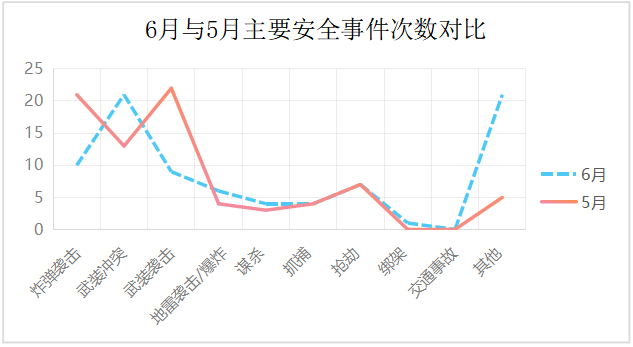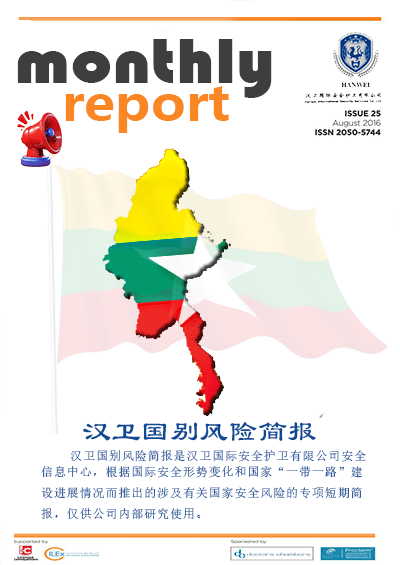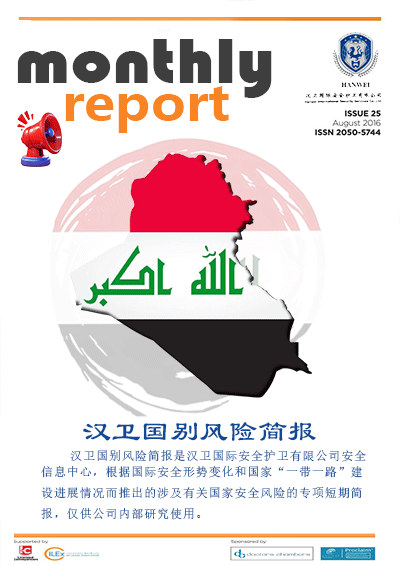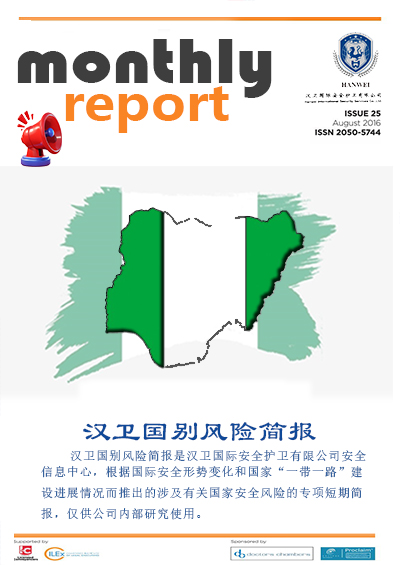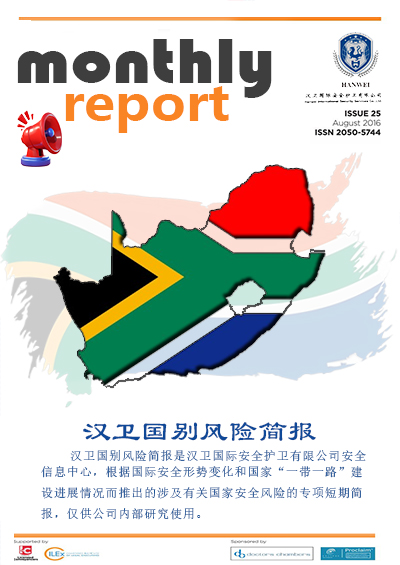Myanmar Risk Monthly Report - June
According to the security public opinion report of Hanwei International, a total of 105 representative security incidents of various types occurred in Myanmar in June, 12 more than in May. These security incidents resulted in 89 deaths and 121 injuries. Among the sorted security categories, the security incidents are mainly armed conflicts and bomb attacks. The security incidents mainly occurred in Shan State, Mandalay Region, Kachin State, Rakhine State, etc.
Hanwei International analysis shows that Myanmar's security situation has become relatively tense. Statistically, security incidents have increased slightly compared with the previous month, deaths have decreased significantly, and the number of injuries has increased slightly. Ethnic armed groups accuse the Myanmar government forces of violating the ceasefire agreement again and say they will take retaliatory actions. New conflicts have broken out in many places, and the relations between the Ta'ang National Liberation Army and the Shan State Progressive Party are tense.
Myanmar's general election is being stepped up in preparation, and various countries hope for Myanmar's peaceful development.
Chairman of Myanmar's State Administration Council (SAC) Min Aung Hlaing recently stated that although elections cannot be held nationwide, they will be conducted gradually by region. Currently, the SAC is actively advancing election preparations across the country. For the 2024 voter list update campaign, it is estimated that there will be 90,000 voter units and 1.15 million voter registration points nationwide, with plans to deploy 42,000 voter registration and statistics teams. The SAC has also organized meetings related to election activities, which include the Election Commission, the SAC-controlled e-Government department, and the High-Level Department of Science and Technology. A number of election-related activities have been carried out, including constituency delimitation and biometric information collection. At present, local election commissions are using advanced voter list management systems and detailed voter list management systems to input and classify voter lists by region. Chairman Min Aung Hlaing stated at the National Planning and Management Committee Meeting (3/2024) that successfully holding free and fair multi-party democratic general elections is the ultimate goal of the National Planning and Management Committee, and thus every effort must be made to ensure the success of the elections. Min Aung Hlaing emphasized that making necessary preparations to ensure the accuracy of the voter list is crucial, and for this purpose, a nationwide population census will commence in October. On the morning of June 15, Chairman Min Aung Hlaing and his entourage met with staff from local district and township-level departments in Meiktila, Mandalay Region, and delivered a speech, noting that all relevant parties are preparing for the holding of free and fair multi-party democratic general elections in 2025.
The 21st Shangri-La Dialogue was held in Singapore from May 31 to June 2.
Defense ministers from around the world attended and discussed international security issues. Defense ministers from major world powers including China and the United States, as well as heads of state and defense ministers from ASEAN countries, participated in the Shangri-La Dialogue. It is learned that Myanmar representatives will not attend the event. On June 12, in the Binyin Hall reception hall in Naypyidaw, the capital of Myanmar, Senior General Moe Moe Aye, Chief of the General Staff of the Myanmar Defense Services (Army, Navy and Air Force), met with a visiting delegation led by the Director of India's Military Intelligence Directorate. They had in-depth exchanges and reached consensus on enhancing friendly and close cooperation between the two militaries. On June 11, the new Ambassador of the United Arab Emirates (UAE) to the Republic of the Union of Myanmar and the new Ambassador of Sri Lanka to Myanmar presented their credentials to Senior General Min Aung Hlaing, Chairman of Myanmar's State Administration Council (SAC), one after another. Also on June 11, Ambassador Chen Hai of the Chinese Embassy in Myanmar donated 6 police patrol boats to Myanmar, which is part of the implementation of the agreement signed by the national leaders of both countries in January 2020. China-Myanmar relations continue to move forward steadily in accordance with the established guidelines. Thailand's new Foreign Minister Maris Sangiampongsa stated at a press conference that the Myanmar issue will be listed as a priority in the security field. He expressed the hope that Myanmar's crisis can be resolved through peaceful negotiations, and Thailand is willing to participate as a key player and play an important role in promoting peace talks in Myanmar. On June 19, the China Peace Development Foundation, Yangon Chinese Cultural Center, Myanmar-China Exchange and Cooperation Association, and Yangon University of Foreign Languages jointly held an event in Yangon to commemorate the 70th anniversary of the formulation of the Five Principles of Peaceful Coexistence. Counselor Qiao Li of the Chinese Embassy in Myanmar and Than Than Nu, daughter of Myanmar's first Prime Minister U Nu, attended and delivered speeches. More than 100 representatives from over 40 Chinese and Myanmar civil organizations, enterprises, think tanks, media outlets, and universities participated in the event.
Myanmar's economic growth has nearly stagnated; improving power shortages will boost development.
According to the US dollar to Myanmar kyat exchange rate released by the Central Bank of Myanmar, the buying rate is 2100.00 and the selling rate is 2106.00. Sean Turnell, an Australian economist who served as an economic advisor during the National League for Democracy government, stated at a press conference hosted by the National Unity Government that Myanmar's stability has been disrupted, people no longer have confidence in the Myanmar kyat, and there is a huge gap between export and import volumes. The military's approach to solving this problem by printing money has plunged Myanmar's economy into chaos. On June 3rd, according to the civilian National Unity Government and Australian economist Sean Turnell, the Myanmar military ruling group has printed approximately 30 trillion kyats in the three years since the coup, leading to a collapse in the currency's value. U Tin Tun Naing, Federal Minister of Planning, Finance and Industry of the National Unity Government, together with Australian economist Sean Turnell (former advisor to detained State Counsellor Daw Aung San Suu Kyi), stated at a press conference, "While there may be other factors contributing to the depreciation of the Myanmar kyat, the fundamental reason remains the large-scale issuance of nearly 30 trillion kyats by the military ruling regime from the time of the coup until today." A report released by the World Bank indicates that due to factors such as inflation, fluctuations in foreign exchange rates, power shortages, escalating conflicts, and labor shortages, the Bank has lowered Myanmar's economic growth forecast to 1%. In December 2023, the World Bank projected that Myanmar's economy would grow by 2%, but it has now revised its 2024 GDP growth forecast for Myanmar to only 1%. Major China-Myanmar border trade ports have suspended trade since the "1027 military operation" in 2023, and as of now, this suspension has lasted nearly 8 months. It is understood that there are 17 border ports in Myanmar in total, among which 6 important ones are controlled by armed groups, and the remaining 11 are controlled by the State Administration Council (SAC). Among the 11 trade ports controlled by the SAC, 3 have suspended trade, and although the remaining 8 are operating normally, their trade volumes have decreased.
Recently, the 400kW distributed photovoltaic project of Datang Myanmar Taipingjiang Phase I Hydropower Station was successfully connected to the grid and put into operation, marking a crucial step in the "coupling development" of Datang Yunnan Hydropower United Company and sounding the charge for the "coupling development" of Datang Overseas Investment Company! The project started construction on April 25, 2024, and was connected to the grid for operation on May 31. After completion, the project is expected to generate an average annual electricity output of 594.74 MWh, which can reduce carbon emissions by 504 tons. It is a demonstration case of "technical transformation for quality and efficiency improvement" that reduces high-priced off-grid electricity, increases backup power sources for power plants, and improves production reliability. It is also an important measure to alleviate the current power shortage around the project area and promote local development. According to information from the Ministry of Electricity, the Upper Jingtang Hydropower Station in southern Shan State is under full construction. So far, 82% of the entire hydropower project has been completed, and it is expected to finish all construction work within the 2024-25 fiscal year. Sources from Yangon Industrial Zone indicate that since June 15, the daily power supply time to 28 industrial zones in Yangon Region has been restored to 8 hours, compared with only 4 hours per day previously. On the morning of June 22, U Nyunt Htoo, Union Minister of the Ministry of Electricity and Energy of Myanmar, inspected the work of installing hydraulic elevator dams at the Banlang Hydropower Station. U Aye Ko, Deputy Minister of the Ministry of Electricity and Energy, and relevant responsible persons accompanied the inspection. At present, 80% of the Banlang Hydropower Station has been completed, and it is expected to generate 911 million to 919 million kWh of electricity annually after completion.
Living difficulties are hard to alleviate, and poverty is worsening.
With the depreciation of the Myanmar kyat and rising inflation, domestic prices have surged and the cost of living has increased, which may lead to a rise in the number of people working abroad. Labor experts and business observers have expressed concerns about this. The depreciation of the kyat has been gradual over the past few years, but the current depreciation is more severe. Although the government has set a minimum daily wage of 4,800 kyats, this is actually mainly paid in factories and workplaces. The depreciation of the kyat has a direct impact on workers' living standards, and the number of people working abroad is likely to increase as a result. According to the latest report from the Myanmar Internet Project, at least 279 areas in Myanmar have suffered full or partial internet shutdowns. The report points out that Sagaing Region is the most severely affected by internet shutdowns, with internet services in 85 locations disrupted. In addition, Kachin State and Chin State follow closely, with internet services cut off in 31 and 24 locations respectively. Beyond these areas, Myanmar's capital Naypyidaw, Yangon, and 14 other regions, as well as parts of some states, have not been spared. Internet blockades are not limited to remote areas; major cities and economic centers have also been affected. Information about the upcoming closure of roads towards Lashio in northern Shan State has spread on social media. Local residents report that people familiar with soldiers of the Kokang Alliance Army have revealed news of the road closure, so everyone is stocking up on food in advance. At present, in areas controlled by the State Administration Council (SAC) in northern Shan State, such as Muse, Lashio, Kyaukme, Hsipaw, and Nawnghkio, the military is increasing its troops and conducting shelling, leaving local people worried about the resumption of hostilities. On June 12, the World Bank estimated that 32% of Myanmar's total population is living in poverty. Moreover, due to factors such as inflation and rising unemployment, poverty has worsened across Myanmar. The World Bank stated that before the pandemic, the number of poor people in Myanmar was 7 million. In 2015, the poor population accounted for 32% of the total population. In 2024, the number of poor people in Myanmar has returned to the 2015 level, and the poverty situation is likely to deteriorate over time. According to local residents, due to the ongoing fighting in Rakhine State, local people fleeing the war are in urgent need of food assistance. People trapped in the city are facing difficulties due to the suspension of bank services and a lack of cash. At present, tens of thousands of people in Thandwe Township have fled their homes and taken temporary refuge in temples and schools. A local resident said that people fleeing the war are in urgent need of food aid, while those stranded in the city are facing difficulties due to the suspension of bank services and a shortage of cash. Due to the fighting, banks moved cash in advance and then closed. The mobile money circulation system has been halted due to internet issues, making it even harder to obtain cash.
Conflicts continue to occur, and Myanmar's security situation is not optimistic.
On June 4, the sound of bombings continued in Mong Mit, northern Myanmar. The Ta'ang National Liberation Army (TNLA) announced that Myanmar military forces had once again violated the ceasefire agreement by continuously launching heavy weapons in Mong Mit Township, northern Shan State, and stated that it would take retaliatory actions. It is reported that the Myanmar State Administration Council (SAC) purchased a large number of drones from abroad and transported the majority of them to Rakhine State and northern Shan State. Nearly 300 were sent to Rakhine State, and nearly 400 to the Northeast Military Region Command in Lashio, northern Shan State. Deliveries were also made to other provinces and states. In addition to drones, thousands of drone bombs produced by defense ordnance factories under the SAC were transported, and an attack drone unit was established. Currently, they are in a state of continuous combat readiness. On June 11, 18 territories including Sittwe Sub-township of Waimaw Township, Kachin State, and the tactical operations command of Sittwe military forces were captured by the KIA (Kachin Independence Army) coalition. As a result, all military outposts and camps of military forces, border guards, and militia around Sittwe Sub-township were seized, and Sittwe Sub-township itself came under KIA control. Thus, on the Waimaw-Kambaiti line, only Kambaiti and a few military outposts and camps remain. Consequently, the Kambaiti border trade port and sub-town controlled by the SAC on the Myanmar-China border are in a precarious situation. On June 14, the Arakan Army released information stating that after intensifying its offensive two months ago, military forces in Maungdaw Township captured 10 outposts and camps, including the Moya Wadi tactical operations command, within two weeks in June. On June 15, the 5th Military Operations Command and Camp 346 in Kamaya, where military forces are stationed in Tonzang Township, Rakhine State, shelled the area until 10 p.m. After the shelling stopped, drones and military fighter jets bombed the surrounding areas of Tonzang Township until midnight. Local residents tried their best to flee, and the casualties remain unknown. In November 2023, the military outpost on Kennedy Hill in Tiddim Township, northern Chin State, was captured by PDF-Zoland. On the morning of June 18, 2024, the military recaptured the Kennedy Hill outpost. The Ta'ang National Liberation Army (TNLA) announced that on June 18, military forces stationed in Wunmadi Village, Nawnghkio Township, Shan State, launched 4 shells from drones at a TNLA camp in Sama Village, resulting in 1 TNLA soldier killed and 4 injured. In the border area between Indawgyi and Hpakant in Mohnyin Township, Kachin State, three key military frontline outposts—Hwe Long, Nyaung Bin, and Kyauk Wa—jointly garrisoned by military forces and militia were captured by the Kachin Independence Army. On June 25, conflicts broke out in areas such as Sakanda Nan and Nyan Chain Yae Gone in Kyaukme Township, Shan State. As soon as the conflicts erupted, all departments and institutions, including police stations and courts, were closed, and all non-CDM (Civil Disobedience Movement) employees fled. Residents in the town also closed their shops and fled to nearby areas for shelter. In Nawnghkio, Kyaukme (northern Shan State), and Mogok, Mandalay Region, conflicts between the TNLA and Myanmar government forces continued, forcing local residents to flee their homes and become refugees. On the same day, the TNLA and the People's Defense Force coalition joined the conflict. On June 26, conflicts between the two sides continued. During the two-day conflict from June 25 to 26, the TNLA coalition captured multiple military camps in Mogok Township, including the Daonan Qiongshan Camp, Strategic Heights Camp, Shwe Ta Ya, Pan Oo Phet, and White Hill Heights. At around 5 a.m. on June 25, some military outposts in Madaya Township were attacked by the People's Defense Force coalition. At 8:30 a.m., military fighter jets arrived to provide air support. The People's Defense Force coalition attacked the anti-aircraft battalion of the military stationed in Indein Myan in Madaya Township, and the conflict continues. Recently, the defense forces designated Lashio and Pyin Oo Lwin as emergency areas potentially vulnerable to military attacks and dispatched a large number of reinforcements. A military source stated that the two cities have received orders for troops to remain on high alert. Since June 25, military camps in Nawnghkio, Kyaukme, Hsipaw, and Mogok townships have been successively attacked, after which Lashio and Pyin Oo Lwin were designated as emergency areas by the defense forces.
Hanwei International's recommendations:
Try to minimize going out and avoid unnecessary outings. When going out, stay away from areas where conflicts occur between Myanmar's military and local armed groups. In case of sudden conflicts, quickly find a bunker and take shelter in a safe place.
Keep in mind the relevant emergency phone numbers so that you can quickly call for help in case of an emergency:
Myanmar emergency police number: 0095-199
Myanmar medical emergency number: 0095-192
Consular protection and assistance hotline of the Consulate-General of the People's Republic of China in Mandalay: 0095-9-259172726
Consular protection and assistance hotline of the Embassy of the People's Republic of China in Myanmar: 0095-9-43209657
Ministry of Foreign Affairs of the People's Republic of China global consular protection and service hotline (24-hour): 0086-10-12308 or 0086-10-65612308
Chart 1: Classification of Security Incidents in June
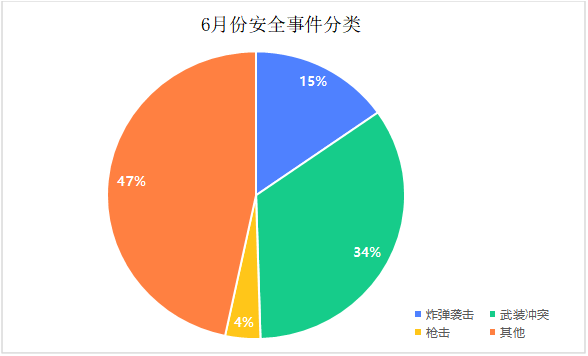
Chart 2: Classification and Statistics of Deaths/Injuries in June
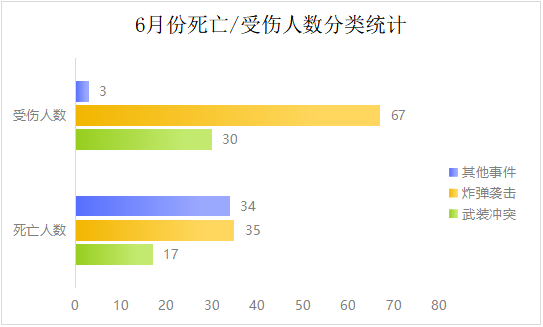
Chart 3: Statistics of Security Incidents in Major Provinces/States in June
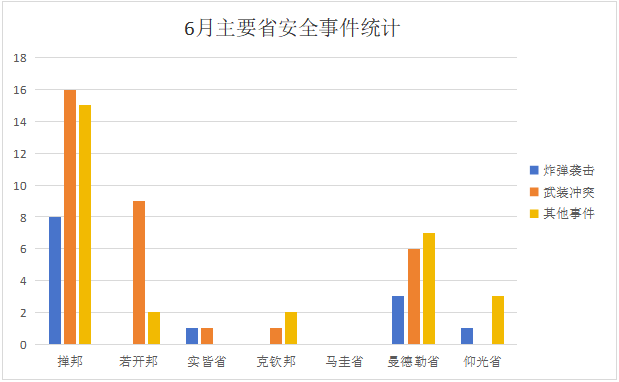
Chart 4: Comparison of the Number of Major Security Incidents in June and May
